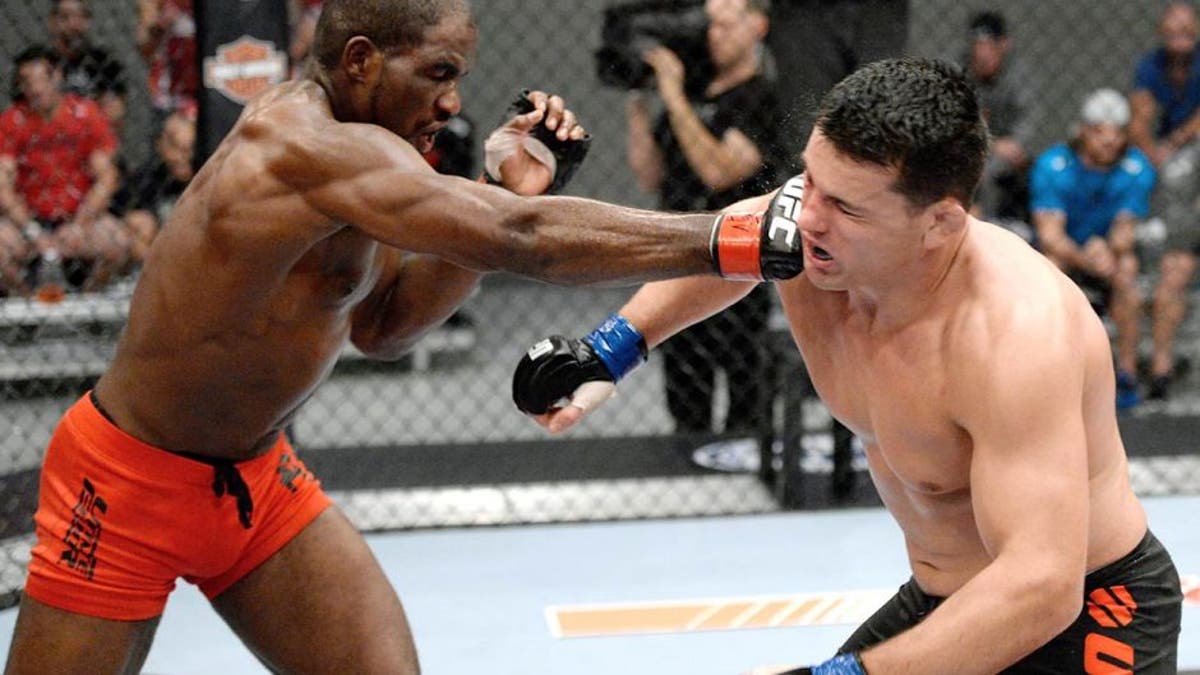
LAS VEGAS, NV - NOVEMBER 21: (L-R) Team Edgar fighter Corey Anderson punches team Edgar fighter Patrick Walsh in their semi-final fight during filming of season nineteen of The Ultimate Fighter on November 21, 2013 in Las Vegas, Nevada. (Photo by Jeff Bottari/Zuffa LLC/Zuffa LLC via Getty Images) *** Local Caption *** Corey Anderson;Patrick Walsh
An old wrestling coach of Corey Anderson's had a hard and fast rule about getting upset over losses. Anderson and his teammates were allowed to be sad when they lost -- just not for very long, before getting back to work.
"It's that wrestling mentality," the UFC light heavyweight said.
"You wrestled every weekend, so very few go undefeated. That coach always told us that we had five minutes to sulk over a loss, and that was it. For five minutes, we could cry, cuss, whatever we needed to. But, he told us that he didn't want to hear anything else about the loss once we came back."
Anderson had to put that tool to good use after he lost a big national finals match. "It was the biggest match of my life, in my senior year. I was in the finals and was ranked No. 1 in one ranking and my opponent was listed as No. 1 in the other rankings. He beat me fair and square in our match. There was no crying and cussing. We hugged it out, and that was it," he recounted.
"Many things in life can get discouraging. You have to learn to take a loss in life. It can either light a fire under you're a** or you can beat yourself up about it. When you beat yourself up about a loss, you end up taking time off and while you are taking time off, people are passing you up."
Corey Anderson doesn't like to lose, but more than that, he can't stand letting others pass him up simply for lack of effort on his part.
That's why, after a rough loss to Gian Villante last April -- his first as a professional -- Anderson refused to sulk and got right back in the gym, even though he was pretty badly injured. (Warning: Graphic Image Below!)
"I took a day off, and drove home," he told FOX Sports.
"That fight, I got my legs beat up pretty bad. But, the next morning after my day off, I was walking on a treadmill. I ended up running three miles once I got warmed up. Then, I went to a local gym and started hitting mits. Soon I started teaching grappling, and then after a while, I was able to roll with a face mask on.
"I went to Matt Mitrione's camp in Indy, did some wrestling and other great work, there. I just made sure my face gear was good to go and I got back to work. I don't like losing, but I gave it everything I had in that fight. That's all you can do in a fight. Afterwards, you have to improve."
Heading into his UFC 191 bout Sept. 5 in Las Vegas against Jan Blachowicz, Anderson knows that his ceaseless work has indeed been fruitful. "I know I've improved since April," he says.
"I've only been fighting for two years, and I'm 25 years old. I'll hopefully be fighting when I'm 35. I've got time to grow and get better. It's a new career for me, so I'm trying to learn something new."
Anderson spent a lot more time on his ground game since April, and says that is one area where he's grown immensely. "Jiu-jitsu is a big part of my training for me, now," he explains.
"I've been rolling in a gi for the first time since I got out to Jersey. I earned my blue belt. I bought a new gi for motivation to keep coming back (laughs). I upped it so that I was training jiu-jitsu four to five times a week, with takedowns. My takedowns are also improving, my chokes, and my transitions. My coaches say that my ground game is coming along and that when I am able to mix in punches, knees, elbows and use hard strikes from the clinch, it's going to be very good for me."
Corey Anderson's "0" in the loss column may be gone, but he isn't grieving it much. After all, he's got too much future ahead of him and too many new submissions to try out to look at what's behind him.
